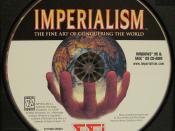Racism, colonialism and imperialism are related in many ways. They all have cultural relationships that span time. From the earliest days of civilization until today, the relationship of the three can be identified clearly. Racism is a thought or belief that one race is better than the other. Imperialism is the national policy or practice of acquiring foreign territories or establishing dominance over other nations. Colonialism is a policy by which a nation maintains or extends control over foreign dependencies. Wherever there is imperialism, racism and colonialism accompany it with pride and dignity.
The novel, "A Passage to India" by E. M Forster does not get in depth on the subject of racism. It talks about the strong national pride of the English and their concept of the Indians. It describes the leaders of England and the propaganda they used to develop such a powerful sense of national pride. It is this strong national pride that turned into racism.
The people believed so much in their own race that differing races became inferior. This is how hatred between races hatched from its frail shell.
Imperialism has been a policy in use for a long time but has not been as common as civilization has progressed. Almost all of the European countries have practiced imperialism in the eighteen and nineteen hundreds. The English had an empire in India, the Spanish had an empire in Latin America, the Portuguese had an empire in South America, and the Germans/Austrians had an empire in Eastern Europe. These empires do not exist today because society's have changed to the point were it is a taboo to take over other countries using force of any kind. Even now, the war against Iraq shows that imperialism still exists in most government systems. One country bombards another in...


